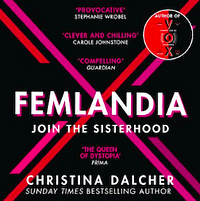You need to sign in or sign up before continuing.
Take a photo of a barcode or cover
Whilst 'Vox' and 'Q' are dark and disturbing portrayals of human nature, they are solid dystopian novels which I rather enjoyed. With 'Femlandia', Christine Dalcher has gone one step further is trying to leave her reader deeply unsettled and questioning everything they believe about human nature. The main plot line is an interesting premise, but I warn you now that, by the end, this novel strays to a bizarre place which does not feel as enjoyable as Dalcher's other novels.
We are introduced to Miranda and her daughter Emma as the world (for some unexplained reason) has fallen into debt and chaos. Supermarkets are low on food, electricity and running water are a distant memory, and people are either killing each other or themselves. Rather than face the danger of this grim reality, Miranda and Emma seek refuge in a local 'feminist' commune, Femlandia. These, as established through flashbacks, were founded by Win, Miranda's mother. What appears to be a safe paradise for broken women clearly has some dark things bubbling under the surface...
All in all, the premise is solid and we have some interesting characters in the mix. I thought the flashbacks to Win's formative years and the abusive treatment which shaped her, were particularly well written. Even if she experienced some horrific things, Win becomes an awful villain, a vile person amongst a generally awful cast of characters. The very end is clever, and makes society feel like a grim cycle of misogyny. It is just a shame that the plot on the way there is... bizarre!
3 stars for Dalcher's latest work. Fingers crossed we have a better return to form in her next novel.
Thank you to NetGalley and the publisher who provided an ARC of this book in exchange for an honest review.
We are introduced to Miranda and her daughter Emma as the world (for some unexplained reason) has fallen into debt and chaos. Supermarkets are low on food, electricity and running water are a distant memory, and people are either killing each other or themselves. Rather than face the danger of this grim reality, Miranda and Emma seek refuge in a local 'feminist' commune, Femlandia. These, as established through flashbacks, were founded by Win, Miranda's mother. What appears to be a safe paradise for broken women clearly has some dark things bubbling under the surface...
All in all, the premise is solid and we have some interesting characters in the mix. I thought the flashbacks to Win's formative years and the abusive treatment which shaped her, were particularly well written. Even if she experienced some horrific things, Win becomes an awful villain, a vile person amongst a generally awful cast of characters. The very end is clever, and makes society feel like a grim cycle of misogyny. It is just a shame that the plot on the way there is... bizarre!
3 stars for Dalcher's latest work. Fingers crossed we have a better return to form in her next novel.
Thank you to NetGalley and the publisher who provided an ARC of this book in exchange for an honest review.
My problem with this book is that it's too surface level. We have the black and white camps of the comically puritanical misandrists versus every grown man we hear of being either abusive or a rapist. You must fall into one camp or the other, with no room for nuance. The ending sequence also made little sense to me, as did the big reveal. Disappointingly without nuance and completely shoves aside exceptions to this binary like non-binary or trans people existing, which annoys me because it feels as if the author say nuance and dodged it neatly and carried on. Disappointing and TERFy.
This was bad. If you want to know how bad, look at the bit where the main character enters a dark outbuilding, refuses to turn on the lights out of fear, goes back out to fetch matches that she doesn’t need because she remembers after fetching the matches that there’s a convenient flashlight by the door.
But the flashlight is too bright so she covers it with her shirt, she searches the office space in the building and finds folders which ‘she doesn’t have enough light to read by’ so she starts taping post-its to the window panes for some reason? Maybe take off the cloth covering the flashlight if you need more light?? Am I losing my mind or is all this a little dumb? It takes like 10 pages for us to find out what’s in this outbuilding as well. This book was infuriating.
But the flashlight is too bright so she covers it with her shirt, she searches the office space in the building and finds folders which ‘she doesn’t have enough light to read by’ so she starts taping post-its to the window panes for some reason? Maybe take off the cloth covering the flashlight if you need more light?? Am I losing my mind or is all this a little dumb? It takes like 10 pages for us to find out what’s in this outbuilding as well. This book was infuriating.
I had to think about this one for a while. There are barely any likeable characters in this novel, which I struggled with especially within the context of a book about a feminist community. But they seemed like realistic personalities, and I could understand where they were coming from.
On a more petty note, as a reader who enjoys post-apocalyptic fiction I took issue with the portrayal of the DMV as completely empty after this book's precipitating action.
On a more petty note, as a reader who enjoys post-apocalyptic fiction I took issue with the portrayal of the DMV as completely empty after this book's precipitating action.
"a feminist commune, set up and explored during an active economic apocalypse? sign me up!" said a woefully naive me.
the lead character is flat and frankly annoying, and so Not Like Other Girls ("What do they call that? Tall? Grande? One of those. I never could figure out why “tall” was the name for the smallest size.") despite being such a caricature of femininity it was hard to stomach. i don't need to identify with a lead, but i need to understand their reasoning, especially if i can't bring myself to actually like them.
the prose beats you over the head because the author assumes you're an idiot. the memories serve no purpose other than to re-iterate the lead's perspective. entire paragraphs devoted to making sure the reader comes to the same conclusion as the lead. suffocating attempts at sarcasm and wit, insufferable monologuing, and a lack of world-building made the first 10 chapters feel like 40.
i honestly couldn't even make it to the actual commune - these first 10 chapters have felt claustrophobic, and not in a fun thriller way.
did not - could not - finish
the lead character is flat and frankly annoying, and so Not Like Other Girls ("What do they call that? Tall? Grande? One of those. I never could figure out why “tall” was the name for the smallest size.") despite being such a caricature of femininity it was hard to stomach. i don't need to identify with a lead, but i need to understand their reasoning, especially if i can't bring myself to actually like them.
the prose beats you over the head because the author assumes you're an idiot. the memories serve no purpose other than to re-iterate the lead's perspective. entire paragraphs devoted to making sure the reader comes to the same conclusion as the lead. suffocating attempts at sarcasm and wit, insufferable monologuing, and a lack of world-building made the first 10 chapters feel like 40.
i honestly couldn't even make it to the actual commune - these first 10 chapters have felt claustrophobic, and not in a fun thriller way.
did not - could not - finish
challenging
dark
emotional
tense
medium-paced
Plot or Character Driven:
Plot
Strong character development:
Yes
Loveable characters:
No
Diverse cast of characters:
No
Flaws of characters a main focus:
No
adventurous
challenging
dark
emotional
reflective
tense
medium-paced
Plot or Character Driven:
N/A
Strong character development:
Yes
Loveable characters:
Complicated
Diverse cast of characters:
Complicated
Flaws of characters a main focus:
Yes
dark
emotional
medium-paced
Plot or Character Driven:
A mix
Strong character development:
Complicated
Loveable characters:
Complicated
Diverse cast of characters:
Complicated
Flaws of characters a main focus:
Yes
challenging
dark
tense
fast-paced
Plot or Character Driven:
A mix
Strong character development:
Complicated
Loveable characters:
Complicated
Diverse cast of characters:
Yes
Flaws of characters a main focus:
Yes
A page-turner with some thought-provoking ideas about feminism, gender ‘characteristics’ and how we might all behave post-apocalypse. This particular apocalypse is one we can all easily imagine and all the scarier for that.
Moderate: Animal cruelty, Bullying, Child abuse, Child death, Confinement, Death, Domestic abuse, Emotional abuse, Physical abuse, Rape, Sexism, Sexual assault, Sexual content, Sexual violence, Slavery, Suicide, Violence, Blood, Abortion, Pregnancy, Injury/Injury detail
I thought the premise of the book was really clever and the first 100 pages I really enjoyed but the second Miranda and Emma make it to Femlandia it went downhill for me.
I wasn’t sure what Dalcher was trying to say and I don’t think she gave herself the space to try; in only 315 pages the book felt rushed without plot points being properly expanded on.
At first I was expecting a look at a community in which woman run, live and thrive without the interference of men. This does appear to be the aim of Femlandia, as created by Win Somers, the protagonist’s mother, but the aim and final product are not the same. How it differs lies with the women’s desire in the “commune” to pro-create which they routinely struggle to do without men. Although they use sperm banks, it is revealed that they are not allowed to screen for female chromosomes and therefore cannot discern whether a baby will be male or female. This is the central conflict of the book and their work around is horrific.
I didn’t generally like Miranda, I think partly because she felt naive and because her husband was good to her she couldn’t understand the issues other women face from husband, family members and other male abusers. I found that quite infuriating; she has virtually no empathy and no desire to understand. I guess the book does create a clear dichotomy between Miranda and her mother Win who have very different views and therefore have a very estranged relationship.
Overall, I was disappointed. It felt like it was a book showing why we need men and that women can be just as awful as they can, something we already know and are aware of but very much in different ways. When men have been the centre of history, tech, politics and generally, I struggled to agree with a lot of the thoughts and themes in this book. What Win, Jen and Kate did for sperm is horrific and should never have happened, but it felt like a change in pace to what the book could’ve been about and I think I was disappointed by this fact.
I wasn’t sure what Dalcher was trying to say and I don’t think she gave herself the space to try; in only 315 pages the book felt rushed without plot points being properly expanded on.
At first I was expecting a look at a community in which woman run, live and thrive without the interference of men. This does appear to be the aim of Femlandia, as created by Win Somers, the protagonist’s mother, but the aim and final product are not the same. How it differs lies with the women’s desire in the “commune” to pro-create which they routinely struggle to do without men. Although they use sperm banks, it is revealed that they are not allowed to screen for female chromosomes and therefore cannot discern whether a baby will be male or female. This is the central conflict of the book and their work around is horrific.
I didn’t generally like Miranda, I think partly because she felt naive and because her husband was good to her she couldn’t understand the issues other women face from husband, family members and other male abusers. I found that quite infuriating; she has virtually no empathy and no desire to understand. I guess the book does create a clear dichotomy between Miranda and her mother Win who have very different views and therefore have a very estranged relationship.
Overall, I was disappointed. It felt like it was a book showing why we need men and that women can be just as awful as they can, something we already know and are aware of but very much in different ways. When men have been the centre of history, tech, politics and generally, I struggled to agree with a lot of the thoughts and themes in this book. What Win, Jen and Kate did for sperm is horrific and should never have happened, but it felt like a change in pace to what the book could’ve been about and I think I was disappointed by this fact.







